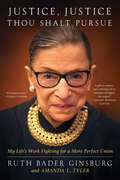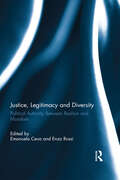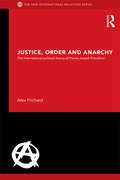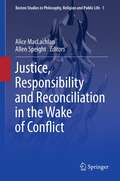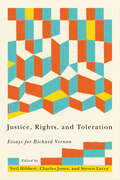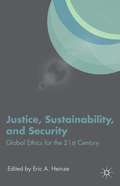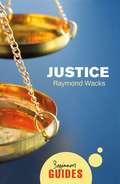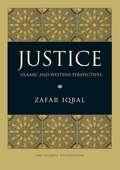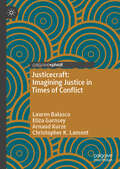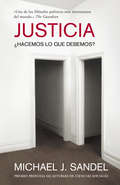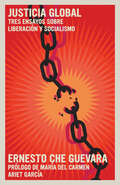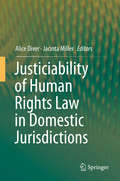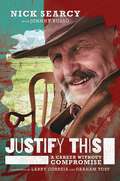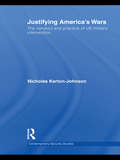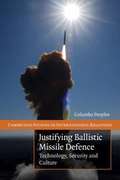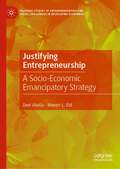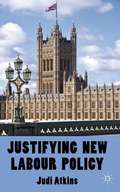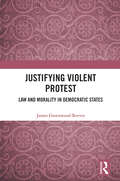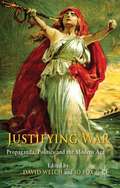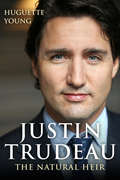- Table View
- List View
Justice, Justice Thou Shalt Pursue: My Life's Work Fighting for a More Perfect Union
by Ruth Bader Ginsburg Amanda L. TylerRuth Bader Ginsburg&’s final book offers an intimate look at her extraordinary life and details her lifelong pursuit for gender equality and a &“more perfect Union.&”In the fall of 2019, Justice Ruth Bader Ginsburg visited the University of California, Berkeley School of Law to honor her friend, the late Herma Hill Kay, with whom Ginsburg had coauthored the very first casebook on sex-based discrimination in 1974. During Justice Ginsburg&’s visit, she shared her life story with Amanda L. Tyler, a Berkeley Law professor and former Ginsburg law clerk. Their intimate conversation is recorded here in Justice, Justice Thou Shalt Pursue, along with previously unpublished materials that detail Ginsburg&’s long career. These include notable briefs and oral arguments, Ginsburg&’s last speeches, and her favorite opinions that she wrote as a Supreme Court Justice (many in dissent), along with the statements that she read from the bench in those important cases. Each document was carefully chosen by Ginsburg and Tyler to tell the litigation strategy at the heart of Ginsburg&’s unwavering commitment to achieve &“a more perfect Union.&” Ruth Bader Ginsburg was an advocate and jurist for gender equality, ensuring that the United States Constitution leaves no person behind and allows every individual to achieve their full human potential. Her work transformed not just the American legal landscape, but American society. As revealed in these pages, Ginsburg dismantled long-entrenched systems of discrimination based on outdated stereotypes by showing how such laws hold back both genders. With her death, the country lost a hero whose incredible life and legacy made the United States a society in which &“We the People,&” for whom the Constitution is written, includes everyone.
Justice, Legitimacy, and Diversity: Political Authority Between Realism and Moralism
by Emanuela Ceva Enzo RossiMost contemporary political philosophers take justice—rather than legitimacy—to be the fundamental virtue of political institutions vis-à-vis the challenges of ethical diversity. Justice-driven theorists are primarily concerned with finding mutually acceptable terms to arbitrate the claims of conflicting individuals and groups. Legitimacy-driven theorists, instead, focus on the conditions under which those exercising political authority on an ethically heterogeneous polity are entitled to do so. But what difference would it make to the management of ethical diversity in liberal democratic societies if legitimacy were prior to or independent from justice?This question identifies a widely underexplored issue whose theoretical salience shows how the understanding of what constitutes the primary question of political philosophy has a deep impact on how practical political questions are interpreted and addressed. What difference would it make, for example, whether the difficulties concerning the safeguard of human rights were couched in terms of the justice or of the legitimacy of the documents and treaties sanctioning their implementation. How should the issue of the quality of democracies be addressed whether one assigned priority to the justice or legitimacy of democratic institutions? Addressing these and other topical questions, the book offers a new theoretical angle from which to consider a number of pressing social and political issues.This book was previously published as a special issue of the Critical Review of Social and Political Philosophy.
Justice, Order and Anarchy: The International Political Theory of Pierre-Joseph Proudhon (New International Relations)
by Alex PrichardThis book provides a contextual account of the first anarchist theory of war and peace, and sheds new light on our contemporary understandings of anarchy in International Relations. Although anarchy is arguably the core concept of the discipline of international relations, scholarship has largely ignored the insights of the first anarchist, Pierre-Joseph Proudhon. Proudhon's anarchism was a critique of the projects of national unification, universal dominion, republican statism and the providentialism at the heart of enlightenment social theory. While his break with the key tropes of modernity pushed him to the margins of political theory, Prichard links Proudhon back into the republican tradition of political thought from which his ideas emerged, and shows how his defence of anarchy was a critique of the totalising modernist projects of his contemporaries. Given that we are today moving beyond the very statist processes Proudhon objected to, his writings present an original take on how to institutionalise justice and order in our radically pluralised, anarchic international order. Rethinking the concept and understanding of anarchy, Justice, Order and Anarchy will be of interest to students and scholars of political philosophy, anarchism and international relations theory.
Justice, Politics, and the Family
by Tamara Metz Daniel EngsterAt a time when same-sex marriage, gay adoption, and the rise of single-parent households challenge traditional views of the family, this innovative volume helps readers put such issues into social and legal perspective. Engster and Metz bring together essential readings in political and legal theory and organise them to illuminate pressing contemporary debates on the family: gender and justice, parents and children, the state and globalisation. Justice, Politics, and the Family is an engaging and a diverse addition to the area of critical legal theory and sociology.
Justice, Responsibility and Reconciliation in the Wake of Conflict
by Allen Speight Alice MaclachlanWhat are the moral obligations of participants and bystanders during--and in the wake of -a conflict? How have theoretical understandings of justice, peace and responsibility changed in the face of contemporary realities of war? Drawing on the work of leading scholars in the fields of philosophy, political theory, international law, religious studies and peace studies, the collection significantly advances current literature on war, justice and post-conflict reconciliation. Contributors address some of the most pressing issues of international and civil conflict, including the tension between attributing individual and collective responsibility for the wrongs of war, the trade-offs made between the search for truth and demands for justice, and the conceptual intricacies of coming to understand just what is meant by 'peace' and 'conflict.' Individual essays also address concrete topics including the international criminal court, reparations, truces, political apologies, truth commissions and criminal trials, with an eye to contemporary examples from conflicts in the Middle East, Africa and North and South America.
Justice, Rights, and Toleration: Essays for Richard Vernon
by Neil Hibbert, Charles Jones, and Steven LecceThe political theory of Richard Vernon has been a guiding light for students of politics for over five decades. From the situated ethics of shared citizenship to the normative character of individuals’ connections to members of other societies and generations, Vernon has cleared a distinctive course in his contributions to the many complex dimensions of political morality.Justice, Rights, and Toleration centres on the core ideas that animate Vernon’s approcach to political theory. Contributors to this volume – all former students and colleagues of Vernon – offer critical engagement with the fundamental themes threaded throughout the thinker’s work on the perennial political challenges in liberal democratic societies, including the understanding of citizenship and political membership, justice within and between nations and generations, the rights of children and parents, and the idea of toleration. Vernon articulated a clear vision of the nature of these problems as well as a nuanced approach to addressing them, one rooted in the ideas of democratic dialogue and justice. The essays in this volume are a testament to the breadth of the pressing issues on which Vernon’s work continues to advance critical insights.Justice, Rights, and Toleration provides a worthy tribute to the wide range of Richard Vernon’s interests and the inspiration still to be found in his deep yet subtle body of work in political theory.
Justice, Sustainability, And Security
by Eric A. HeinzeJustice, Sustainability, and Security not only enhances our knowledge of these issues, but it teases out our moral dimensions and offer prescriptions for how governments and global actors might craft their policies to better consider their effects on the global human condition.
Justice: A Beginner's Guide (Beginner's Guides)
by Raymond WacksIn this highly topical introduction, Professor Raymond Wacks explains and evaluates the leading theories of justice that have shaped our societies and their legislative and judicial systems, and explores the extent to which fundamental notions like fairness, equality and freedom are reflected in contemporary society. By analysing some of the world&’s most pressing challenges, including terrorism, corruption and migration, Justice: A Beginner&’s Guide shows how these ideas are applied in practice – and how far we still have to go to achieve social justice.
Justice: Islamic and Western Perspectives
by Zafar IqbalA thought-provoking monograph which provides a systematic and rigorous exposition of a range of social, economic and political views from the vantage point of Islam. Humanity is in a state of confusion and is torn apart by conflicting claims of civilization superiority. In the context of current misunderstanding on the east-west relationship, this comparative study will help to alleviate hostilities.
Justicecraft: Imagining Justice in Times of Conflict
by Christopher K. Lamont Eliza Garnsey Arnaud Kurze Lauren BalascoThis book is about the making of justice. Despite the growing scholarship on transitional and transformative justice, contested struggles for justice in times of political change fail to get the nuanced attention we think they deserve. It seeks to understand how the making of justice is a craft and how this process of craft making is itself a source of political change. The authors introduce a new and novel conceptual framework of justicecraft which sheds light upon political change by unpacking five key elements—the skills, knowledge, labor, affect, and materiality—involved in contested struggles for justice. Justicecraft illuminates the stories and struggles for justice, enabling a greater understanding of accompanying social, political, and cultural shifts in society which unfold during times of conflict. By framing justice as craft, the authors offer a more fluid understanding of how people are producing justice on the ground—and identify the means, the instruments, the language, and claims involved in the process. Each chapter applies the framework of justicecraft to diverse global case illustrations of struggles against past, present, and future injustices and wrongdoings and draws out the key elements embedded in these processes.
Justicia
by Michael J. SandelJusticia ha vendido un millón de ejemplares, el curso de Michael Sandel en Harvard ha inspirado a millones de personas y su versión televisiva es un éxito de masas. La explicación es sencilla: al examinar el papel de la justicia en nuestras vidas y en la sociedad, Sandel explica cómo la filosofía puede ayudar a entender la política, la religión o la moral, e incluso nuestras propias convicciones. Deteniéndose en cuestiones tan polémicas como el aborto, la eutanasia, el matrimonio homosexual, el patriotismo o la disidencia, Sandel muestra que las cuestiones más importantes que afrontamos como ciudadanos pueden someterse a un debate racional. Justicia garantiza a los lectores de todas las edades e ideas políticas un viaje fascinante a través de los conceptos que subyacen en las controversias políticas y morales de la actualidad.Justicia es entretenido, estimulante e inteligente, una adición esencial a la breve lista de libros que tratan convincentemente las cuestiones fundamentales de nuestra vida en sociedad."Un libro indispensable para cualquiera que aspire a ser un buen ciudadano."Walter Isaacson, presidente del Aspen Institute"Sandel asombra en este amplio repaso de temas candentes. Erudito, ameno y muy humano, es una lectura que te cambiará." Publishers Weekly
Justicia Global: Tres ensayos sobre liberación y socialismo (The Che Guevara Library)
by Ernesto Che GuevaraA Spanish-language edition of three speeches on corporate globalism and imperialism by one of the most widely known guerilla fighters, political theorists, and organizers, Che Guevara.In this collection of three speeches, Ernesto Che Guevara offers a revolutionary view of a world in which human solidarity and understanding replace imperialist agression and exploitation. First, in a sharp speech given in Algeria on February 24, 1965 at the Afro-Asia Economic Seminar, Che speaks about the nature of capitalism and the revolutionary struggle that would open the way for a new, socialist society. Guevara's 1965 essay, "Socialism and Man in Cuba," is a milestone in twentieth-century emancipatory social thought. Finally, &“Message to the Tricontinental&” is one of Che&’s more well-known works, which outlines the tactics and strategies that should be followed in revolutionary struggle.This collection of writings merges Che's philosophy, politics, and economics in his all encompassing, coherent revolutionary vision. His ideas and his struggle strike a chord in the current search for global justice.¿Existe una alternativa a la globalización empresarial y al militarismo que asola nuestro planeta? Estas obras clásicas de Ernesto Che Guevara presentan una visión revolucionaria de un mundo diferente en el que la solidaridad humana y la comprensión sustituyen a la agresión y la explotación imperialistas.
Justicia inútil
by Jorge Fernández Menéndez¿La justicia es inútil en México? A través de siete casos paradigmáticos y una serie de entrevistas a personajes cruciales, se muestran la impunidad, la corrupción y los desaciertos de policías, ministerios públicos y jueces. Además de su contenido periodístico, nos ofrece una reflexión sobre las fallas estructurales del sistema judicial, la impunidad y la batalla que se libra por la seguridad y contra el narcotráfico. Una denuncia de cómo el poder, el dinero y la corrupción pueden modificar casi cualquier sentencia.
Justiciability of Human Rights Law in Domestic Jurisdictions
by Alice Diver Jacinta MillerThis collection of 16 essays by 19 contributors calls into question the notion of domestic justiciability across a wide range of human rights issues, such as health, human dignity, criminal justice, property and transitional democracy. The authors offer critical analyses of a number of rights frameworks, focusing in considerable detail upon specific countries (e. g. Libya, Colombia, Ireland, the United Kingdom, Northern Ireland, South Africa, Nigeria, Zimbabwe, Kenya, India) and regions (e. g. Europe, Africa) to highlight the various challenges which continue to vex human rights advocates and scholars. In doing so they pinpoint some of the major tensions that still exist within developing and developed jurisdictions, via a myriad range of perspectives. The essays collectively present a diverse assortment of themes unified by a single 'golden thread' - that of the domestic interpretations given to human rights protections. They raise questions as to how such rights might be made substantive at the level of domestic implementation, and query the extent to which these rights can, or even should, be enforced by the courts. The potential strains in the relationship between human rights and the rule of law, is further called into question by another central theme: that of human dignity. A fundamental dilemma arises in respect of the extent to which a 'right' to dignity can best be promoted, protected or monitored by domestic decision-makers. Similar issues are apparent within the context of the protection of those human rights which increasingly tend to engage social, political or economic considerations and interests. Whilst these arguments are often framed principally in terms of 'rights,' the collective message that emerges from this book is that such rights may often be, in fact, essentially non-justiciable. Readers of this text will perhaps feel compelled to reflect carefully and fully upon what it tells us about human rights law generally, and the extent to which such rights may be truly amenable to adjudication by the courts.
Justify This: A Career Without Compromise
by Nick Searcy&“I&’ve played serial killers, rapists, racists, Klansmen, sexual harassers, thieves—I mean, let&’s face it. I&’ve played a LOT of Democrats.&” —Nick Searcy In Justify This, veteran character actor Nick Searcy takes you through his wide-ranging career, from both sides of the camera as an actor and director, to guest-hosting for Rush Limbaugh, managing a professional wrestler, co-starring in the hit show Justified—and somehow continuing to work in Hollywood even AFTER he went to Washington, DC, on January 6, 2021.Director of Gosnell: The Trial of America&’s Biggest Serial Killer and producer/star of the seminal documentary about January 6, Capitol Punishment, Nick&’s story of following his heart to become a professional actor and following his conscience and faith to stand up for what he believed—even though it might have cost him the career he built—will be an inspiration to you—and make you laugh along the way.Actor, director, producer, writer, wrestling manager, guest columnist, stand-up comic, filmmaker, and one of the meanest Twitter people ever, Nick Searcy is a unique voice of common sense in today&’s culture.
Justifying America's Wars: The Conduct and Practice of US Military Intervention (Contemporary Security Studies)
by Nicholas Kerton-JohnsonThis book examines the justifications for, and practice of, war by the US since 1990, and examines four case studies: the Gulf War, Kosovo, Afghanistan and Iraq. The author undertakes an examination of presidential speeches and public documents from this period to determine the focal points on which the respective presidents based their rhetoric for war. The work then examines the practice of war in the light of these justifications to determine whether changes in justifications correlate with changes in practice. In particular, the justificatory discourse finds four key themes that emerge in the presidential discourses, which are tracked across the case studies and point to the fundamental driving force in US motivations for going to war. The four key themes which emerge from the data are: international law or norms; human rights; national interest; and egoist morality (similar too, but wider than, 'exceptionalism'). This analysis shows that 9/11 resulted in a radical shift away from an international law and human rights-focused justificatory discourse, to one which was overwhelmingly dominated by egoist-morality justifications and national interest. This book will be of much interest to students of US foreign policy, humanitarian intervention, Security Studies, and IR theory.
Justifying Ballistic Missile Defence
by Columba PeoplesTechnology is championed as the solution to modern security problems, but also blamed as their cause. This book assesses the way in which these two views collide in the debate over ballistic missile defense: a complex, costly and controversial system intended to defend the United States from nuclear missile attacks. Columba Peoples shows how, in the face of strong scientific and strategic critique, advocates of missile defense seek to justify its development by reference to broader culturally embedded perceptions of the promises and perils of technological development. Unpacking the assumptions behind the justification of missile defense initiatives, both past and present, this book illustrates how common-sense understandings of technology are combined and used to legitimate this controversial and costly defense program. In doing so it engages fundamental debates over understandings of technological development, human agency and the relationship between technology and security.
Justifying Entrepreneurship: A Socio-Economic Emancipatory Strategy (Palgrave Studies of Entrepreneurship and Social Challenges in Developing Economies)
by Devi Akella Niveen L. EidThis book on entrepreneurship, compiles a series of evidence-based episodes from the lives of the marginalized and the minority-oriented entrepreneurs to comprehend whether entrepreneurship is truly a socio-economic emancipatory strategy. Varying experiences of entrepreneurs, from different geographical territories, origins and gender are examined under a critical lens to deconstruct its emancipatory potential and appreciate its power in generating human freedom, equal opportunities, and in uplifting the oppressed and suppressed classes globally. In specific the book explores entrepreneurs located in two geographically diverse regions across the world. The social entrepreneurs in the contested region of Palestine and the black and ethnic entrepreneurial group based in Georgia, United States. The book is a planned and purposeful compilation of raw [i.e., in terms of emotions and feelings], untold stories of entrepreneurs who have embraced entrepreneurship to eradicate their harsh realities and subsequently emancipate themselves. The book integrates a critical perspective, encompassing a variety of theoretical frameworks such as critical race theory, critical theory, critical realism and different power modalities and philosophies to investigate the emancipatory potential of entrepreneurship and justify it as a socio-economic emancipatory strategy. This book ventures into the murky and dark waters of entrepreneurship by exploring this concept within the black and immigrant communities, as a collective social entrepreneurship reform movement, female entrepreneurship, informal entrepreneurship operating under occupation, to provide detailed insights on bricolage and other complexed economic issues.
Justifying Genocide: Germany and the Armenians from Bismark to Hitler
by Stefan IhrigAs Stefan Ihrig shows in this first comprehensive study, many Germans sympathized with the Ottomans' longstanding repression of the Armenians and with the Turks' program of extermination during World War I. In the Nazis' version of history, the Armenian Genocide was justifiable because it had made possible the astonishing rise of the New Turkey.
Justifying Interventions in Africa: (De)Stabilizing Sovereignty in Liberia, Burundi and the Congo
by Nina WilénThis new paperback edition of Justifying Interventions in Africa includes a new preface written by Professor Annika Björkdahl from Lund University. Analysing the UN interventions in Liberia, Burundi and the Congo, Wilén poses the question of how one can stabilize a state through external intervention without destabilizing sovereignty. She critically examines the justifications for international and regional interventions through a social constructivist framework.
Justifying New Labour Policy
by Judi AtkinsAn original combination of theoretical innovation and a detailed empirical analysis of the ideas, language and policy of New Labour. Politicians often appeal to moral principles and arguments in their efforts to win support for new policy programmes. Yet the question of how politicians use moral language has until now been neglected by scholars.
Justifying Violent Protest: Law and Morality in Democratic States
by James Greenwood-ReevesThis book presents a radical, but compelling, argument that liberal democracies must be able accommodate violent protest. We often think of violent protest as being alien to liberal democracy, an extraordinary occurrence within our peaceful societies. Yet this is simply untrue. Violent protest is a frequent and normal part of democratic life. The real question is: should it be? Can rebellion or riot against government ever be morally justifiable in our society? By framing state demands for obedience as "legitimacy claims," or moral arguments, states who make illogical and unjust laws make weaker arguments for obedience. This in turn gives citizens stronger moral reasons to disobey. Violence can act as moral dialogue – with expressive and instrumental value in denouncing unjust laws – and can have just as important a role in democracy as peaceful protest. This book examines the activism of Hong Kong pro-democracy protesters, Extinction Rebellion, Black Lives Matter, and many other groups internationally, in order to demonstrate that not only can violent protest be acceptable; in times of grave injustice, it is unavoidable. This book will appeal to a broad range of academics, in legal and political theory, sociolegal studies, criminology, history, and philosophy, as well as others with interests in contemporary forms of protest.
Justifying War
by David Welch Jo FoxA new assessment of the debates about Just War in the twentieth and twenty-first centuries, from the imperial wars of the nineteenth century through the age of total war, the evolution of human rights discourse and international law, to proportionality during the Cold War and the redefinition of authority with the ascendancy of terror groups.
Justin Trudeau and Canadian Foreign Policy (Canada and International Affairs)
by Norman Hillmer Philippe LagasséThis book offers the first comprehensive analysis of Canadian foreign policy under the government of Justin Trudeau, with a concentration on the areas of climate change, trade, Indigenous rights, arms sales, refugees, military affairs, and relationships with the United States and China. At the book’s core is Trudeau’s biggest and most unexpected challenge: the election of Donald Trump as president of the United States. Drawing on recognized experts from across Canada, this latest edition of the respected Canada Among Nations series will be essential reading for students of international relations and Canadian foreign policy and for a wider readership interested in Canada’s age of Trudeau.See other books in the Canada Among Nations series here: https://carleton.ca/npsia/canada-among-nations/
Justin Trudeau: The Natural Heir
by Huguette Young George TombsA National Bestseller • The Hill Times: Best Books of 2016 This unauthorized biography provides a rare look at the real Justin Trudeau, retracing his steps from his early days to the height of power. Having grown up in the shadow of his famous father, a political giant who dominated Canadian politics for almost sixteen years, Justin Trudeau took many detours before discovering that he was a natural politician, with qualities, such as a charismatic ease with the public, that his father never possessed. Yet to most Canadians, Trudeau remains a blank slate. Inexperienced and underestimated, he was able, in his early forties, to catapult the Liberal Party of Canada from third to first place in one giant sweep. It was a historic feat that left a nation amazed and wondering what to expect next. In this unauthorized biography, journalist Huguette Young, who has conducted numerous interviews with Trudeau’s entourage, gives a look inside his inner circle and shows the path his leadership might take. Meant for supporters and skeptics alike, Young’s is a revealing account of one of Canada’s most compelling and enigmatic figures.
